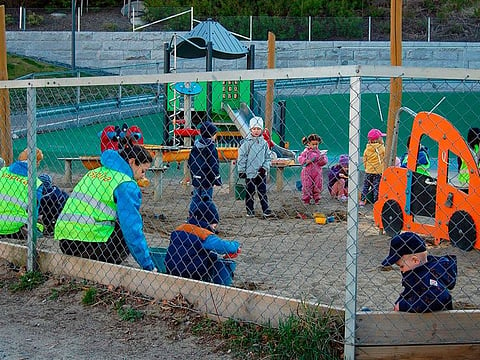Laughter fills Norway’s nurseries as they reopen after COVID-19 fight
Along with Austria, Denmark and Germany, Norway among first countries to ease curbs

Oslo: Most were itching to meet their friends, others a little wary about leaving their parents: the youngest Norwegians started returning to pre-schools on Monday, a month after being sent home over the new coronavirus.
Breaking the silence of the past five weeks, laughter once again filled the playground of Espira Grefsen Stasjon, a nursery school in the north of Norway’s capital Oslo.
Bundled up in jackets and warm caps, the toddlers arrived under a deceptive spring sun on Monday morning.
Some were reluctant to let go of their parents’ hands, but most were impatient to run and join their friends in the sandpit.
“He was so excited we had to leave the house early to come here and see the other kids,” Silje Skifjell said of her eldest child Isaak, after she dropped off him and his younger brother Kasper.
“I almost was crying, he was so happy to see his friends,” she said.
Staff wearing reflective vests were on site to receive the children at the gate, as entry to the building is banned to the public to limit the risk of contamination.
But neither parents nor employees were wearing masks.
Along with Austria, Denmark and Germany, Norway is among the first countries to start easing restrictions, which were announced on March 12.
The Nordic country, with a population of around 5.4 million, has registered 7,068 confirmed cases of the new coronavirus and 154 deaths, and has reported a significant drop in new hospital admissions.
Return to normal
Norway has yet to declare victory over the virus, but said in early April it was considered “under control,” and the country has embarked on a slow and gradual return to normal.
After the pre-schools this week, primary schools will reopen their doors to the youngest pupils next Monday.
Authorities said they ordered the reopening because children have been less affected by COVID-19.
“Going to pre-school is safe,” Education Minister Guri Melby has repeated leading up to the reopening.
However, some parents have objected to the decision.
As in neighbouring Denmark, which started opening schools last week, a Facebook group called “My child should not be a guinea pig for COVID-19” has been created and an online petition objecting to the reopening has nearly 30,000 signatures.
According to a poll published by broadcaster NRK over the weekend, 24 percent of parents did not want to send their children back to pre-school and 13 percent said they were unsure.
On social media, accusations of “gambling with the lives of children” and playing “Russian roulette” have appeared.
“I won’t send my daughter to daycare until I’m 110 percent reassured,” said one concerned parent in a Facebook post.
Pre-schools have to ensure certain health protocols.
Adult supervision
In particular, children under the age of three have to be in groups of three under one adult’s supervision. Those between three and six years old can stay in groups of six.
At Espira Grefsen Stasjon, an employee wearing blue plastic gloves was wiping down the jungle gym as the children played.
“We’ve sanitised the kindergarten, so everything is very clean”,” said director Tone Mila, who was also there to answer parents’ questions.
“Of course, now the biggest job to do is the hygiene,” she told AFP.
Officially the argument for the reopening has been made on health grounds, but it also comes as a relief for parents who’ve had to juggle parenting with working from home.
“It has been a challenge,” said Olav Kneppen after leaving his four-year-old son Oliver at the Espira Grefsen Stasjon.
“It was fun to spend more time with him than usual but it was a bit frustrating with work because I couldn’t do everything I was supposed to do,” he told AFP.
Asked about any apprehensions he might have about the children returning, he said he trusted in the authorities’ judgement.
“At home, we choose to follow the recommendations from the health authorities. So when they recommend this, we trust that it will be relatively safe,” he said.
“Of course, we are not 100 percent safe, but I agree that it’s time to do it now.”
Sign up for the Daily Briefing
Get the latest news and updates straight to your inbox


